|
De Amerikaanse schrijver Robert Ludlum werd geboren in New York op 25 mei 1927. Zie ook alle tags voor Robert Ludlum op dit blog.
Uit: The Bourne Supremacy
“As swiftly as the order of the evening had been disrupted it was restored. With luck, through the tuxedoed manager, the explanation that an impetuous bartender had mistaken a belligerent drunk for something far more serious would be acceptable to the police.
Suddenly, all thoughts of fines and official harassment were swept away as his eyes were drawn to a clump of white fabric on the floor across the room - in front of the door to the inner offices. White cloth, pure white - the priest? ...
"Come!" ordered the manager, getting to his feet and heading for the door.
"The police!" objected the brother. "One of us should speak to them, calm them, do what we can."
"It may be that we can do nothing but give them our heads! Quickly!"
Inside the dimly lit corridor the proof was there. The slain guard lay in a river of his own blood ... He approached the body and with his handkerchief he wiped away the blood and stared at the face.
"We are dead," he whispered. "Kowloon is dead, Hong Kong dead. All is dead."
"What?"
"This man is the Vice-Premier of the People's Republic, successor to the Chairman himself."
"Here! Look!" The first-assistant brother lunged toward the body of the dead laoban. Alongside the riddled, bleeding corpse was a black bandanna. It was lying flat, the fabric with the curlicues of white discoloured by blotches of red. The brother picked it up and gasped at the writing in the circle of blood underneath: JASON BOURNE.
The manager sprang across the floor. "Great Christian Jesus!" he uttered, his whole body trembling. "He's come back. The assassin has come back to Asia! Jason Bourne! He's come back!"
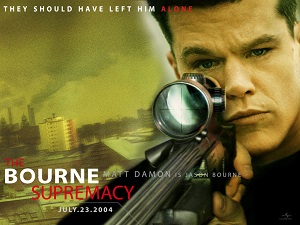
Robert Ludlum (25 mei 1927 – 12 maart 2001)
Filmaffiche met Matt Damon als Jason Bourne
De Amerikaanse dichter Theodore HuebnerRoethke werd geboren in Saginaw, Michigan op 25 mei 1908. Zie ook alle tags voor Theodore Roethke op dit blog.
The Meadow Mouse
1
In a shoe box stuffed in an old nylon stocking
Sleeps the baby mouse I found in the meadow,
Where he trembled and shook beneath a stick
Till I caught him up by the tail and brought him in,
Cradled in my hand,
A little quaker, the whole body of him trembling,
His absurd whiskers sticking out like a cartoon-mouse,
His feet like small leaves,
Little lizard-feet,
Whitish and spread wide when he tried to struggle away,
Wriggling like a minuscule puppy.
Now he's eaten his three kinds of cheese and drunk from his
bottle-cap watering-trough--
So much he just lies in one corner,
His tail curled under him, his belly big
As his head; his bat-like ears
Twitching, tilting toward the least sound.
Do I imagine he no longer trembles
When I come close to him?
He seems no longer to tremble.
2
But this morning the shoe-box house on the back porch is empty.
Where has he gone, my meadow mouse,
My thumb of a child that nuzzled in my palm? --
To run under the hawk's wing,
Under the eye of the great owl watching from the elm-tree,
To live by courtesy of the shrike, the snake, the tom-cat.
I think of the nestling fallen into the deep grass,
The turtle gasping in the dusty rubble of the highway,
The paralytic stunned in the tub, and the water rising,--
All things innocent, hapless, forsaken.
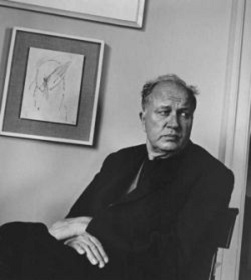
Theodore Roethke (25 mei 1908 - 1 augustus 1963)
De Franse schrijver en historicus Georges Bordonove werd geboren in Enghien-les-Bains op 25 mei 1920. Zie ook alle tags voor Georges Bordonove op dit blog.
Uit: Les Templiers. Histoire et Tragédie
« Ils vivent sans avoir rien en propre, pas même leur volonté. Vêtus simplement et couverts de poussière, ils ont le visage brûlé des ardeurs du soleil, le regard fier et sévère : à l'approche du combat, ils s'arment de foi au-dedans et de fer au-dehors ; leurs armes sont leur unique parure ; ils s'en servent avec courage dans les plus grands périls, sans craindre le nombre, ni la force des barbares : toute leur confiance est dans le Dieu des armées ; et, en combattant pour sa cause, ils cherchent une victoire certaine ou une mort sainte et honorable.
O l'heureux genre de vie, dans lequel on peut attendre la mort sans crainte, la désirer avec joie, et la recevoir avec assurance !
Saint Bernard de Clairvaux
Le soldat a la gloire, le moine le repos. Le templier abjurait l'un et l'autre. Il réunissait ce que les deux vies ont de plus dur, les périls et les abstinences. La grande affaire du Moyen-Âge fut la guerre sainte, la croisade ; l'idéal de la croisade semblait réalisé dans l'Ordre du Temple. C'était la croisade devenue fixe et permanente.”
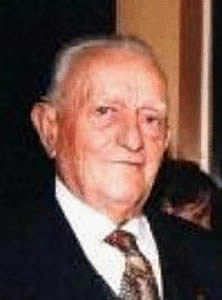
Georges Bordonove (25 mei 1920 - 16 maart 2007)
De Canadese schrijver William Patrick Kinsella werd geboren op 25 mei 1935 in Edmonton, Alberta. Zie ook alle tags voor W. P. Kinsella op dit blog.
Uit: Where it began: 'Shoeless Joe'
“he book came first. Actually, the story came first. I wrote a 20-page short story that eventually became Chapter 1 of my novel "Shoeless Joe." The story was published in an anthology, and a young editor at the publishing house Houghton Mifflin in Boston, Larry Kessenich, read not the story but a review of the anthology in Publishers Weekly. On the strength of that, he wrote to me at Desolate U. in Alberta, where I was teaching bonehead English, to suggest that if the story was part of a novel, he wanted to see it, and if it wasn't, it should be.
I wrote back to say I would need guidance, as I had published four collections of short stories but had never written a publishable novel. We worked well together, and "Shoeless Joe" was just like a baby -- it took nine months. I wrote it under the title "The Kidnapping of J.D. Salinger." Houghton Mifflin chose the title "Shoeless Joe," though they considered "Dreamfield." When finished, it was awarded the Houghton Mifflin Literary Fellowship and was published in 1982.
"Shoeless Joe" was optioned by a small independent movie company that kept it in development for two years before the option expired. Paramount Pictures then optioned it and hired Phil Alden Robinson to write the screenplay. Phil was absolutely in love with my book and kept in touch all through the adaptation -- though I had no input, nor would I have wanted any. Phil explained that there was no way to fit a 300-page novel into an hour-and-40-minute movie. He explained that marvelous characters like Eddie Scissions had to be cut, and that time had to be telescoped in many sequences.”
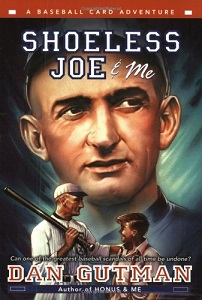
W. P. Kinsella (Edmonton, 25 mei 1935)
Cover
De Duitse schrijver Max von der Grün werd geboren op 25 mei 1926 in Bayreuth. Zie ook alle tags voor Max von der Grün op dit blog.
Uit: Späte Liebe
»Also, wie soll ich dir das erklären ... Es ist nämlich so, pass auf ... Was ich sagen wollte, ist ...«
Burger war nun in dem Maße verlegen wie vordem die Frau. Er suchte nach Worten, endlich sprudelte er los: »Das ist ganz einfach. Ich bin allein, du bist allein also, damit nicht mehr jeder für sich allein ist, ziehen wir einfach zusammen. Ich meine das folgendermaßen nicht so, wie du vielleicht denkst, wilde Ehe und so. Wenn schon, dann mit Unterschrift und Stempel. Verstehst du, was ich sagen will?«
Es dauerte seine Zeit, bis die Gmeiner begriff, dass das ein Heiratsantrag war. Ihre Verblüffung machte sie sprachlos. Endlich stieß sie heraus: »Wolfgang, du spinnst. Was da wohl die Leute sagen, mein Gott. Das möchte ich mal erleben, wie die sich die Mäuler zerreißen.«
»Wunderbar!«, rief Burger und klatschte sich auf die Schenkel. »Wenn du genau wissen willst, wie sich die Leute die Mäuler zerreißen, ist das erst recht ein Grund, mit Unterschrift und Stempel Nägel mit Köpfen zu machen. Denn wenn wir nicht heiraten, wirst du nie erfahren, was die Leute sagen.«
»Und mein Sohn?«, fragte die Gmeiner. »Und meine Susanne?« »Wieso? Verstehe ich nicht. Bist du denen Rechenschaft schuldig?”
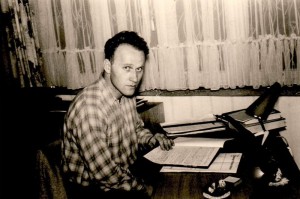
Max von der Grün (25 mei 1926 – 7 april 2005)
In de jaren 1950
De Amerikaanse schrijver en journalist John Gregory Dunne werd geboren op 25 mei 1932 in West Hartford, Connecticut. Zie ook alle tags voor John Gregory Dunne op dit blog.
Uit: Nothing Lost
“The President, who has often feuded with civil rights leaders and the Congressional Black Caucus in the past, has asked the Reverend Jesse Jackson to accompany him from Capital City to Regent in the presidential helicopter.
In a statement Bowne released to reporters, the President said, “Let the healing begin.”
Dixon McCall’s special rhetorical skills always seemed to begin with the construction “Let.” As in, “Let us look forward, not back,” “Let us walk together,” “Let the sun shine through,” “Let the forces of light persevere,” “Let us put our differences behind us.” (All from Dix: Finding the Words That Defined the McCall Presidency, from a speechwriter unhappily influenced by the “thousand points of light” template.)
The autopsy and forensic photos indicated that Parlance had been skinned alive, the meat on his upper thighs sliced with a razor, box cutter, or sharp knife and then pulled away slice by slice with a pair of pliers. The same pliers that had pulled the tongue from his mouth so that he was not able to scream. Edgar Parlance was thirty-nine, a big man, six feet tall, 180 pounds, leading the investigators from the Loomis County Sheriff’s Office and the South Midland Bureau of Investigation to speculate that because of his size it must have taken two or more people to kill him. Then the autopsy report concluded that it wasn’t even the skinning that finished him off. It was a hollow-point from a .38-caliber DS-II Detective Special that blew the back of his head off. One of his knees had been shattered, probably with a tire iron, and what remained of the left side of his face was crushed, apparently by the boots of his assailants. Indicating that Edgar had put up an uncommon struggle before he succumbed. And what turned out to be the most interesting fact of the crime was that his shirt had been torn open and the letter P carved into his chest with what was later identified as a thirteen-inch double-edged knife its manufacturer picturesquely called, in the gun- show catalogues, a Tennessee Toothpick. The assumption of the SMBI detectives and the Loomis County Sheriff’s Department was that the P stood for Parlance, meaning that the killers, whoever they were, were probably familiar with their victim.
As it happened, the first part of the assumption was wrong.”
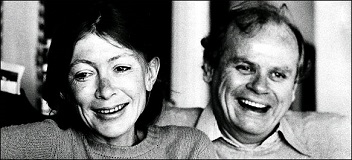
John Gregory Dunne (25 mei 1932 – 30 december 2003)
Hier met Joan Didion in 1977
Zie voor nog meer schrijvers van de 25e mei ook mijn vorige blog van vandaag.
|



